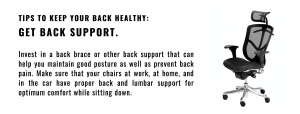How to Keep Your Back in Good Health
Many back-related issues could be avoided if only we were a bit more cautious about our lifestyle and aware of how it affects our spine. In this article, you will find out what you can do to ensure a healthy back. You’ll also learn about some of the possible causes of back pain and how to prevent them.
According to our orthopedic spine surgeon in Delray Beach, implementing some of these in your everyday life can significantly decrease the risk of many back-related conditions, such as lower back pain, sciatica, and herniated discs.

11 actionable tips to keep your back healthy
-
Maintain a healthy diet.
Foods rich in Calcium and vitamin D are great for keeping your bones strong. Also, eat foods rich in omega-3 fatty acid, which assists in maintaining the integrity of skeletal muscles, among many other body systems, and thereby helps prevent back pain.
-
Stay hydrated.
Drinking plenty of water is crucial for back health. Poor hydration can make the spinal discs lose water. This makes them inefficient in absorbing shock and can lead to back pain. You should drink at least six glasses a day.
-
When driving, recline your seat slightly to decrease back strain.
If you can, use lumbar support, and don’t forget to take breaks when driving for a long time.
-
Change positions frequently.
Don’t sit at your desk for 8 hours straight. Take a break every hour or so to stretch your muscles.
-
Control your position throughout the day to make sure you don’t slouch.
Keep a good posture, in general, to help keep our back healthy and free of injury. The best way to do this is by keeping your back straight and shoulders relaxed.
-
Optimize your work surroundings.
Make sure your desk is at the right height.
-
Manage your stress.
High levels of stress can lead to headaches and sleep problems—and back pain is often the result of not getting enough rest. Learn how to control stress with breathing techniques or exercise. This is beneficial not only for your back, but for your health in general.
-
Get back support.
Invest in a back brace or other back support that can help you maintain good posture as well as prevent back pain. Make sure that your chairs at work, at home, and in the car have proper back and lumbar support for optimum comfort while sitting down.
-
Avoid long periods of bending over.
Spending too much time bent over will eventually lead to back injury and even chronic pain. Stretch your back every few minutes and mind your posture.
-
Be cautious when lifting heavy objects.
When lifting something such as groceries off the ground with the hands outstretched overhead, many people tend to twist their spine back and forth in an attempt to pick up the object. This is not only backbreaking; it can lead to back pain down the line as well. When lifting an object, keep your back straight, have a wide stance, and bend from the legs (not from the waist).
-
Work out.
Exercising regularly can keep the muscles around your spine in good shape. Physical activity will help strengthen your back, but you should also be careful about doing too much at once or exercising incorrectly, which could result in injury. You may want to ask a doctor for specific advice on what exercises are safe for you based on your fitness level and health condition.
Staying healthy and in good shape are crucial to maintaining a healthy back. And there you have it: 11 strategies to keep your back in good health. Implement these minor changes in your life, and don’t worry about back problems.

When to see a doctor for back pain?
Be aware of back pain. Some symptoms to look out for include back pain that worsens as the day goes by without relief (even after rest), soreness when reaching behind your back, foot pains with walking, and numbness in hands or feet, which may be caused by spinal cord compression.
If you find yourself with persistent back pain, consult Dr. Hepler, one of the top spine surgeons in Palm Beach County, to find out if you have an underlying medical condition that needs attention or medical treatment.
What are the possible causes of back pain?
According to the Centers for Disease Control and Prevention (CDC), approximately 25% of American adults experience low back pain in the last three months. In fact, it is considered one of the leading causes of disability and a common reason for missing days at work.
There are many potential causes of back pain, including:
Sleeping in a position that is not conducive to back health
For example, sleeping in an awkward position may result in tight neck muscles and back pain when you wake up. Avoid lying on your stomach and always use appropriate pillows to support your body’s proper alignment while sleeping.
Sitting for too long
Sitting for too long can cause back pain, especially if you’re sitting in an unnatural position or slouching. This is because it causes a lot of strain on back muscles and nerves.
Try to find ways to stand up more often throughout the day instead of always being seated at work or home, wherever you spend most of your time. Make sure not to sit in one spot all day either – switch seats every once in a while so that your back muscles are less likely to become overworked. When you do need to sit for long periods of time, take frequent breaks every 20 minutes.
Lifting heavy objects
Lifting heavy objects can lead to back pain because it causes the back muscles and discs in our spine to work harder than they should be. Also, lifting heavy objects with your arm outstretched overhead and twisting the spine back and forth may even lead to back injury down the line.
If you’re lifting something or helping someone else lift a heavy object, make sure your back is straight by using this technique:
- Stand with your feet shoulder-width apart.
- Squat down slightly.
- Keep the back straight without bending at the waist too much.
- Push on your toes as you pull yourself upwards so that the weight of the object shifts from the ground/floor onto your upper body.
- Keep the object as close to your body as possible.
Wearing the wrong footwear while doing heavy work
Wearing the wrong footwear while doing heavy work can cause back pain because it puts a lot of strain on back muscles.
One way to prevent this is to make sure you wear the correct type of shoes for each activity. Try not to wear any footwear that may be too tight or too loose. This will help with back health as your weight distribution becomes more even. In women, it also reduces the likelihood of sudden twists from wearing high heels, which are usually uncomfortable in general (even if they look good!). You can also use shoe insoles designed to reduce back pain.
Pregnancy
It’s normal for pregnant women to experience back pain and discomfort. As their baby grows, the added weight can shift a woman’s center of gravity and force the body to adjust. Their growing uterus puts pressure on other parts of their body as well, including the back.

Back pain can also be a symptom of a medical condition.
There are many causes of back pain, including spinal stenosis, spondylolysis, spondylolisthesis, lumbar stenosis, compression fractures, sagittal malalignment, and – rarely – infections, tumors, or inflammatory conditions.
Due to this large spectrum of possible causes, it is important to get an expert opinion. Our orthopedic spine surgeon in Fort Lauderdale and Delray Beach will be able to diagnose the cause of your pain.
Consult a Spine Doctor to Get the Right Diagnosis and Treatment for Back Pain – About Dr. Matthew Hepler
Dr. Hepler is an adult and pediatric orthopedic spine surgeon in Palm Beach County & Broward County. He treats all conditions of the cervical, thoracic and lumbar spine, and offers spinal stenosis treatment in Delray Beach, West Palm Beach, Boynton Beach and Boca Raton.
He provides non-operative treatment options, including pain medication, steroid injections, and physical therapy, as well as operative treatments, including both minimally invasive techniques and complex reconstruction.
If you’re suffering from back pain, don’t hesitate to schedule a consultation with Dr. Hepler.
The material contained on this site is for informational purposes only and DOES NOT CONSTITUTE THE PROVIDING OF MEDICAL ADVICE, and is not intended to be a substitute for independent professional medical judgment, advice, diagnosis, or treatment. Always seek the advice of your physician or other qualified healthcare providers with any questions or concerns you may have regarding your health.



